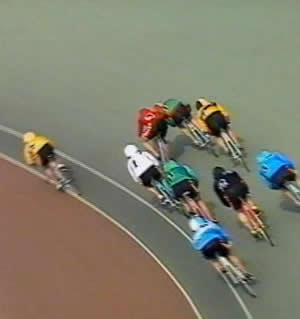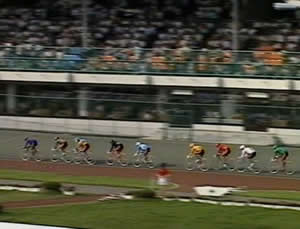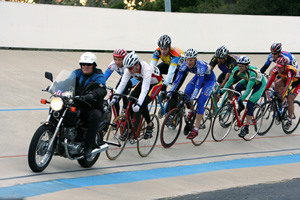|
Home
Passing PASPA
PASPA Colloquy
|
The following continues the discussion on the Senate Floor, where Senator Dominici and Senator DiConcini essentially rejected the interpretation that Keirin should fall under the jurisdiction of PASPA.
PROFESSIONAL AND AMATEUR SPORTS PROTECTION ACT
(Colloquy on the Senate Floor- October 07, 1992)
[Page: S17435]
Mr. DOMENICI. Mr. President, I am extremely pleased that the House has passed the Professional and Amateur Sports Protection Act, S . 474 . As a cosponsor of this legislation I believe that we must eliminate State-sanctioned betting on the outcomes of organized sports contests in our Nation. Sadly, some of our nations greatest scandals have been the result of our sports heroes betting on sporting events. With the passage of this legislation, we clearly eliminate any State-sanctions that would encourage athletes to participate in changing the outcome of any organized sporting event.
Shortly after the Senate-passage of S . 474 , I was made aware of a situation that could be interpreted to fall under the provisions of this bill. The New Mexico State Legislature passed a law that would allow our State to be the first in the Nation to venture into what is a $13 billion industry in Japan--parimutuel bicycle racing, or as its known in Japan, Keirin. This sport is structured in a fashion that is similar to parimutuel horse racing, except that horses and riders are replaced with bicyclists.
In S . 474 , the Senate included provisions that exempted both parimutuel animal racing and jai alai. Since Keirin is still in its developmental stages and is still relatively obscure, it was obviously not included on the exempted list.
I discussed this situation with my good friend from Arizona, Senator Deconcini. Upon reviewing a description of Keirin, the Senator from Arizona also noted the similarities between this sport and those exempted in the bill. I then suggested the possibility of including Keirin in this language. My good friend saw no initial reasons why that would be problem.
Mr. DeCONCINI. That is correct. When the Senator first brought this to my attention in late June, the bill had already passed the Senate. At that time I indicated that if there was an opportunity to resolve this issue in conference, it would be done. Unfortunately, that opportunity did not occur.
Mr. DOMENICI. Clearly, my intent is not to undermine the effectiveness of S . 474 . So, it is my understanding that my good friend from Arizona cleared the possibility of exempting Keirin from the provisions of this bill with our Nation's major sports organizations, the national Football League, the National Basketball Association, Major League Baseball, the National Hockey League, and the National Collegiate Athletic Association, to ensure that they had no concerns.
Mr. DeCONCINI. It is my understanding that the leagues and the NCAA do not object to this type of parimutuel bike racing and did not intend for the bill to cover such a sport. Clearly, this type of bicycle racing does not possess the same threat as other forms of State-sponsored sports betting.
Mr. DOMENICI. I would like to note that this legislation is designed to protect the pure competitiveness of sports in our Nation. Athletes in both amateur and professional sports contend with a great deal of pressure to excel in each contest just by the very nature of sport. State-sanctioned betting only increases the likelihood that some athletes will be compelled to participate in changing the outcomes of contests. There is no reason for our States to add pressure and tension to this setting. Sports enthusiasts cheer their teams to clean, fair outcomes--we should continue to encourage this attitude and practice. Could I ask my friend from Arizona to explain why jai-alai and horse racing were exempted from this legislation?
Mr. DeCONCINI. The reason jai alai and horse racing were exempted from this bill was because jai-alai, like horse racing, is played primarily for the purpose of gambling. The purpose of this act is to protect the integrity of professional and amateur sports, not parimutuel betting schemes. Therefore, Keirin racing should not be covered by this bill and was not intended to be covered.
Mr. DOMENICI. As the Senator has stated, it is clear in S . 474 that parimutuel betting contests are not considered to be sports in the same way as those events contested in our major professional and amateur sports organizations. Obviously, Keirin's obscurity as a parimutuel betting scheme was the factor for its exclusion from those exempted in the legislation. Would the Senator from Arizona agree that the Professional and Amateur Sports Protection Act was not designed to prohibit the State of New Mexico from sanctioning Keirin?
Mr. DECONCINI. Yes, I agree. This bill prohibits State-sponsored betting `on one or more competitive games in which amateur or professional athletes participate, or are intended to participate * * *' It is my interpretation of this prohibition that it would not apply to parimutuel bicycle racing because it does not constitute a `game.' At the time this bill was introduced, I argued against the need to specifically exclude horse racing for the same reason. However, because of the importance of horse racing to the economies of a number of States and our intention for this bill not to apply to horse racing, language was included to clarify that the bill did not apply to such racing.
This bill is meant to prohibit States from changing the nature of baseball, football, hockey, and basketball from wholesome entertainment for the entire family to a game played for the purpose of gambling. Clearly, this is not meant to apply to a sport such as Keirin racing.
[Page: S17436]
Mr. DOMENICI. I thank my good friend, the distinguished Senator from Arizona, for his thoughtful clarification and remarks.
Mr. WALLOP. Mr. President, I would like to ask my colleague from Arizona, the sponsor of the Professional and Amateur Sports Protection Act a question regarding his intent as to the effect of the bill on certain actions in my home State of Wyoming. They are legal now under State law and I want to assure that they will continue.
My concern centers in particular on the practice of calcutta wagering. For those unfamiliar with this tradition, Wyoming law defines it as follows. Calcutta wagering means wagering on the outcome of amateur contests, cutter horse racing, professional rodeo events, or professional golf tournaments in which those who wager bid at auction for the exclusive right to purchase or wager upon a particular contestant or entrant in the event and when the outcome of the event has been decided the total wagers comprising the pool, less a percentage take-out by the event's sponsor, is distributed to those who `purchased' or wagered upon the winning contestants or entrants.
Not only are the calcuttas extremely popular, they are also beneficial as a minimum of 10 percent of the total wagers must be donated to a charitable or benevolent purpose.
In addition, I would like to know whether this bill is intended to effect the other gambling devices, practices or all other bona fide contests currently allowed under Wyoming State law such as raffles, bingo, tickets for raffle, or pull tabs.
Mr. DeCONCINI. I appreciate the Senator's point of view and I can assure him that the practices which are now authorized and conducted under Wyoming State law, including calcutta wagering and the other provisions which he mentioned will not be effected by enactment of this legislation.
Mr. WALLOP. I thank the Senator. I would like to ask the ranking member of the Judiciary Committee, Senator Thurmond if that is his understanding also.
Mr. THURMOND. I assure the Senator from Wyoming that is my understanding.
Mr. WALLOP. I thank my colleagues for their help in clarifying that this will not effect what the people of Wyoming have currently put in place with regard to their State gambling laws.
Mr. BRADLEY. I move the Senate concur in the amendment of the House.
The PRESIDING OFFICER. The question is on agreeing to the motion.
The motion was agreed to.
Mr. BRADLEY. Mr. President, I move to reconsider the vote by which the motion was agreed to.
Mr. BROWN. I move to lay that motion on the table.
The motion to lay on the table was agreed to.
|
    |




